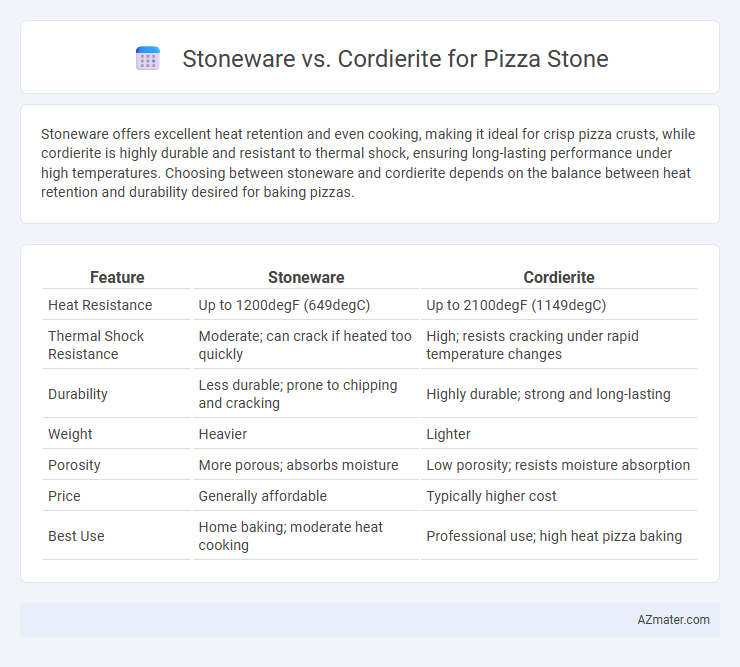Stoneware offers excellent heat retention and even cooking, making it ideal for crisp pizza crusts, while cordierite is highly durable and resistant to thermal shock, ensuring long-lasting performance under high temperatures. Choosing between stoneware and cordierite depends on the balance between heat retention and durability desired for baking pizzas.
Table of Comparison
| Feature | Stoneware | Cordierite |
|---|---|---|
| Heat Resistance | Up to 1200degF (649degC) | Up to 2100degF (1149degC) |
| Thermal Shock Resistance | Moderate; can crack if heated too quickly | High; resists cracking under rapid temperature changes |
| Durability | Less durable; prone to chipping and cracking | Highly durable; strong and long-lasting |
| Weight | Heavier | Lighter |
| Porosity | More porous; absorbs moisture | Low porosity; resists moisture absorption |
| Price | Generally affordable | Typically higher cost |
| Best Use | Home baking; moderate heat cooking | Professional use; high heat pizza baking |
Introduction to Pizza Stones: Stoneware vs Cordierite
Pizza stones crafted from stoneware provide excellent heat retention and even cooking, ideal for achieving a crispy crust at home. Cordierite pizza stones outperform stoneware in thermal shock resistance, allowing rapid heating and cooling without cracking, making them more durable for frequent use. Both materials enhance pizza baking by distributing heat uniformly, but cordierite's superior durability makes it a favored choice among professional and avid home bakers.
What is Stoneware? Key Features
Stoneware is a dense, non-porous ceramic material fired at high temperatures, making it highly durable and heat-retentive for baking purposes. Its even heat distribution and resistance to thermal shock help create crispy pizza crusts without cracking or warping. Stoneware's natural porosity allows moisture absorption, which enhances the texture of baked goods by drawing out excess steam during cooking.
What is Cordierite? Key Properties
Cordierite is a crystalline mineral composed primarily of magnesium, iron, and aluminum silicates, known for its exceptional thermal shock resistance and durability, making it ideal for pizza stones. Its bulk density ranges from 2.5 to 2.9 g/cm3, while its high thermal stability allows it to withstand rapid temperature changes without cracking, unlike typical stoneware. Cordierite's low thermal expansion coefficient (approximately 4.5 x 10-6/degC) ensures consistent heat distribution, resulting in evenly baked pizza crusts and enhanced cooking performance.
Heat Retention: Stoneware vs Cordierite
Cordierite pizza stones offer superior heat retention compared to stoneware due to their ability to withstand higher temperatures without cracking. Stoneware heats evenly but cools faster, making it less efficient for maintaining consistent oven heat. Cordierite's dense mineral composition enables prolonged heat storage, resulting in better baking performance and crust texture.
Thermal Shock Resistance Compared
Cordierite pizza stones offer superior thermal shock resistance compared to stoneware, making them more durable under rapid temperature changes typical in pizza ovens. Stoneware, while providing excellent heat retention and even baking, is more prone to cracking when exposed to sudden temperature fluctuations. Choosing cordierite ensures longer lifespan and consistent performance for high-temperature cooking scenarios.
Durability and Lifespan Differences
Stoneware pizza stones offer excellent heat retention but are more prone to cracking under thermal shock compared to cordierite stones, which are highly resistant to temperature fluctuations and thermal stress. Cordierite's superior durability results in a longer lifespan, often lasting many years without warping or breaking, while stoneware may require more frequent replacement due to its brittleness. For frequent or high-temperature pizza baking, cordierite provides enhanced longevity and reliability, making it the preferred material for long-term use.
Cooking Performance and Crust Results
Cordierite pizza stones excel in heat retention and even heat distribution, resulting in a consistently crispy crust with reduced risk of cracking under high temperatures. Stoneware offers excellent thermal mass but heats more slowly and can be prone to thermal shock, potentially causing uneven cooking or breakage. For optimal cooking performance and superior crust texture, cordierite is favored by professional pizzaiolos due to its durability and efficient heat management.
Ease of Cleaning and Maintenance
Cordierite pizza stones excel in ease of cleaning and maintenance due to their high durability and resistance to thermal shock, allowing them to withstand frequent use without cracking or absorbing odors. Stoneware pizza stones require more careful handling when cleaning, as they are more porous and can absorb oils and food residues, necessitating gentle scrubbing and thorough drying to prevent staining and odor retention. Cordierite's low porosity makes it less prone to bacterial growth, simplifying upkeep and extending the stone's lifespan compared to traditional stoneware options.
Price Comparison: Stoneware vs Cordierite
Stoneware pizza stones typically cost less, ranging from $20 to $50, making them an affordable option for casual home bakers. Cordierite pizza stones, priced between $40 and $100, offer superior thermal shock resistance and durability, justifying the higher investment for frequent use. Choosing between stoneware and cordierite depends on budget constraints and desired lifespan, with cordierite offering better long-term value despite its higher initial price.
Which Pizza Stone Material Should You Choose?
Stoneware offers excellent heat retention and a smooth surface ideal for evenly cooked pizzas, but it can be prone to cracking under thermal shock. Cordierite is highly durable, resistant to thermal shock, and heats evenly, making it a preferred choice for frequent pizza baking. Choose cordierite for long-lasting performance and durability, while stoneware suits those prioritizing heat retention and a traditional baking surface.

Infographic: Stoneware vs Cordierite for Pizza Stone
 azmater.com
azmater.com